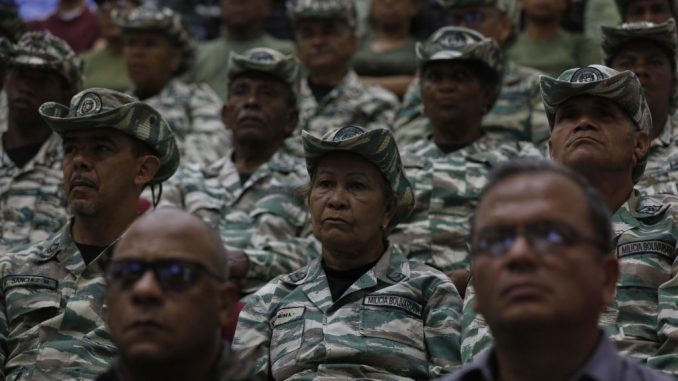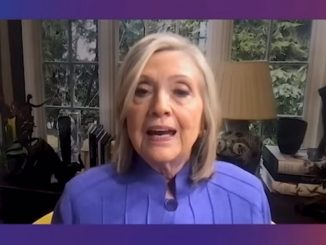
Members of the Bolivarian Militia listen to a recorded speech by President Nicolás Maduro at a military garrison in Caracas, Venezuela, Friday, Sept. 5, 2025. (AP Photo/Cristrian Hernandez)
Published September 7, 2025
CARACAS, September 6, 2025 — Tensions between Washington and Caracas reached a boiling point this week, following a lethal U.S. strike in Caribbean waters and a shadow of military escalation on both sides.
President Donald Trump, doubling down on drug interdiction rhetoric, authorized a targeted strike against what U.S. officials described as a smuggling boat tied to Venezuela’s notorious Tren de Aragua gang—a move that left 11 dead, triggering international concern and fierce repudiation from Caracas.
In response, the U.S. has flooded the region with naval assets and airpower, deploying guided-missile destroyers, amphibious assault ships, and F-35 fighters stationed in Puerto Rico—part of a militarized front intended to combat regional drug flows but interpreted by Venezuela as a looming threat of invasion.
Amid the mounting pressure, President Nicolás Maduro appeared in camouflage at a Caracas military base, overseeing a ceremony that activated civilian militia mobilization and warned of armed resistance should the U.S. advance further. He demanded dialogue, denied any Venezuelan involvement in drug trafficking, and asserted the country’s sovereignty.
Not to be outmatched, Venezuela announced its own countermeasures: a sweeping deployment of 15,000 armed forces, land and maritime operations targeting smuggling routes, and a national narrative that Venezuela stands firm against cocaine production, unlike neighboring Colombia.
The surging friction underscores a broader ideological divide. Secretary of State Marco Rubio—an architect of the Trump administration’s Venezuela policy—remains a vocal advocate for escalatory measures, long pushing for sanctions and intervention to topple Maduro’s regime.
As both nations fortify their stances, Latin America watches anxiously. Lessons from history remind the region of the costs of militarized confrontation, while the growing international headlines reflect a deeper geopolitical realignment in the hemisphere—one where drug policy, sovereignty, and power stratagems collide.
👥 Public/Political Reactions
🇻🇪 Inside Venezuela
-
President Nicolás Maduro:
-
Appeared in camouflage, called up militias, and warned of “armed struggle” if U.S. aggression continues.
-
Rejected U.S. drug-trafficking claims, even mocking the Pentagon’s video of the boat strike as “AI-generated fiction.”
-
Called instead for dialogue, accusing Washington of manufacturing a pretext for regime change.
-
-
Foreign Minister Yván Gil: Cited UN data showing Venezuela is a minor transit country for cocaine, contrasting with Colombia. Warned the U.S. buildup was destabilizing.
-
Opposition leader María Corina Machado: Broke with Maduro, saying the U.S. military pressure was “the right approach” to confront what she called a criminal state.
🇺🇸 United States
-
President Donald Trump:
-
Warned that Venezuelan jets flying near U.S. ships “will be shot down.”
-
Floated possible strikes inside Venezuela against cartel targets.
-
Declared gangs like Tren de Aragua and Cartel of the Suns terrorist organizations.
-
-
Secretary of State Marco Rubio: Backed the strikes, promised operations “will happen again,” and pushed for a tougher stance on Maduro.
-
Critics in Congress:
-
Rep. Ilhan Omar and Sen. Rand Paul questioned the legality of the strike, warning it may violate international law and bypass the War Powers Act.
-
🌍 International & Regional
-
Russia: Called the U.S. strike “absolutely unacceptable.”
-
Iran: Condemned it at the UN as a violation of sovereignty.
-
Colombia: Also criticized the strike as illegal, though with nuance given their own cartel struggles.
-
Trinidad & Tobago: Praised Washington’s tough approach against traffickers.
-
Guyana: Backed the U.S. deployments, citing distrust of Maduro.
📰 Public Sentiment
-
Pro-government Venezuelans rallied behind Maduro’s narrative of sovereignty and resistance, with militias and state media amplifying calls to defend the homeland.
-
Opposition Venezuelans see U.S. pressure as leverage to weaken Maduro’s grip.
-
International analysts describe the U.S. posture as “gunboat diplomacy,” suggesting it aims to intimidate Maduro or fracture his military support base.
 Resulting Effects
Resulting Effects
1. Military Posture and Regional Security
-
The U.S. has significantly increased its military presence in the Caribbean, including guided-missile destroyers, amphibious ships, and F‑35 jets.
-
Venezuela has mobilized 15,000 armed personnel and civilian militias, raising the risk of clashes and heightening regional tensions.
-
Neighboring countries are on alert, creating instability in maritime and airspace zones critical for trade and navigation.
2. Domestic Political Impact
-
Maduro has consolidated nationalist support, portraying himself as the defender of Venezuelan sovereignty.
-
Opposition factions see U.S. pressure as leverage, creating a polarized political climate internally.
-
Public sentiment is split, with fear of escalation alongside rallying support for resistance or external intervention.
3. International Relations
-
Russia and Iran condemned U.S. actions, strengthening their diplomatic and economic ties with Venezuela.
-
Some Caribbean allies (Trinidad & Tobago, Guyana) supported U.S. efforts, while Colombia and other Latin American nations criticized them, reflecting a divided regional stance.
-
The standoff has amplified geopolitical attention on Latin America, signaling potential shifts in alliances and influence.
4. Drug Trafficking and Security Operations
-
U.S. strikes target Venezuelan-linked cartels like Tren de Aragua and Cartel of the Suns.
-
Venezuela denies involvement, but increased militarization may disrupt trafficking routes or push criminal operations into neighboring territories.
-
The heightened focus may result in longer-term shifts in regional anti-narcotics strategy.
5. Risk of Escalation
-
Miscalculations, such as a naval or airspace incident, could escalate into a direct military confrontation.
-
Continued rhetoric and deployments make the Caribbean a high-stakes geopolitical hotspot, with both strategic and humanitarian implications.
🔮 Future Outlook
🔮 Possible Scenarios Ahead
1. Controlled Escalation
-
The U.S. keeps military assets in the Caribbean, with occasional targeted strikes on vessels allegedly tied to drug cartels.
-
Venezuela continues symbolic military mobilizations and fiery rhetoric, but avoids direct clashes.
-
Both sides use the crisis for domestic politics: Trump to project toughness on crime, Maduro to rally nationalist sentiment.
2. Direct Confrontation
-
Risk of miscalculation rises: a Venezuelan jet buzzing a U.S. warship, or a disputed naval encounter, could spark exchange of fire.
-
Trump has already warned that planes getting too close “will be shot down.” Even a single incident could spiral into a limited military conflict.
3. Diplomatic Off-Ramp
-
Despite fiery language, Maduro has repeatedly called for dialogue.
-
Regional mediators (e.g., Brazil, Mexico, or CARICOM) could step in to prevent escalation.
-
A backchannel deal might focus on drug interdiction cooperation or a gradual easing of U.S. sanctions in exchange for de-escalation.
4. Domestic Fallout in Venezuela
-
U.S. pressure may widen divisions within Venezuela’s military and ruling elite.
-
If sanctions tighten alongside military threats, Maduro could face heightened internal dissent—though so far he has consolidated power by portraying himself as the defender of sovereignty.
📊 Geopolitical Implications
-
Latin America: Smaller Caribbean states are split—some support the U.S. crackdown, others fear destabilization. Colombia and Brazil are under pressure to take sides.
-
Global Powers: Russia and Iran may deepen support for Maduro (diplomatically, economically, and possibly militarily) as a way to counter U.S. influence in the Western Hemisphere.
-
Drug Policy: If Washington expands the campaign, it could reshape U.S. counter-narcotics strategy in the region, turning Venezuela into the central battleground instead of Colombia.
⚖️ Risk Factors
-
Miscalculation at Sea or in Airspace → accidental war.
-
Domestic U.S. politics → with Trump pushing aggressive policies, escalation may serve as political theater but risks real conflict.
-
Venezuela’s fragility → economic crisis and international isolation could make Maduro double down rather than back down.
 Bottom Line:
Bottom Line:
The escalating tension between the United States and Venezuela marks one of the most volatile moments in recent Caribbean geopolitics. The U.S. has demonstrated a willingness to project military power—deploying warships, fighter jets, and issuing threats of direct strikes—ostensibly to combat drug trafficking and organized crime. Venezuela, under President Nicolás Maduro, has responded with defiant rhetoric, militia mobilizations, and calls for dialogue, framing the U.S. actions as a threat to national sovereignty and a pretext for regime change.
Public and political reactions highlight a deep divide: Maduro’s government consolidates nationalist support, the opposition cautiously welcomes U.S. pressure, and international actors remain split between concern, condemnation, and cautious endorsement. Analysts warn that any miscalculation—particularly in contested air or maritime zones—could escalate into a direct confrontation with serious regional repercussions.
Looking ahead, the future of U.S.–Venezuelan relations hinges on a delicate balance between deterrence, diplomacy, and domestic political calculations on both sides. While outright war remains unlikely, the standoff underscores the fragility of peace in a region already strained by crime, political polarization, and competing international interests.
SOURCES: AP NEWS – Maduro vows to defend Venezuela’s sovereignty as tensions rise with US
THE INDIAN EXPRESS – Maduro vows to defend Venezuela’s sovereignty as tensions rise with US
CITY NEWS – Maduro vows to defend Venezuela’s sovereignty as tensions rise with US





Be the first to comment